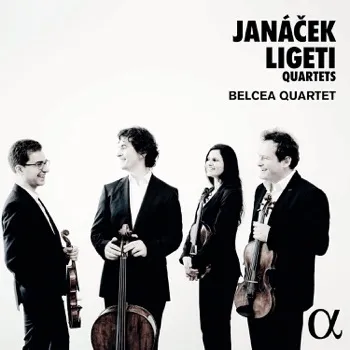How do you like your Janáček? The Czech composer still remains a bit of a mystery to audiences and performances alike, shamefully standing in the shadow of many other of his contemporaries. The two String Quartets contained in this album is surely a new, interesting take on these masterpieces.

But first, we have to touch Ligeti’s First String Quartet which closes this album. Fondly referred to as “Bartók’s seventh quartet”, it goes even beyond the master’s six quartets and produces an almost orchestral sound world, along with a Bartókian motivic exploration and a Shostakovichian rhythmic vitality and sense of irony. The Belcea, as they proved in their much celebrated Bartók String Quartets cycle, are fully attuned to the many sides of Ligeti’s writing. Listen, for instance, to the sound effects at around 08:30 onward, or to the almost orchestral writing at 11:00. The transition to the final movement at around 20:00 is nothing but chilling, with the members use the hushed tremolo to a mesmerizing effect.
Compared to other fine accounts in the catalog, mainly the Hagen quartet, this is one of the best currently available. It will, hopefully, make more listeners appreciate this music. It’s certainly the highlight of this album. A shame though that the producers have chosen to keep the entire piece as a single track, and not split into movements.
Janáček’s two String Quartets are another masterpieces shamefully underrepresented in the catalog, though with some very fine proponents (some listed below). This is the second time around the Belcea are recording these pieces, but at the time this review is published, the old version in not available for purchase nor streaming. In any case. the Belcea offers here a “classical”, transparent look of these pieces, without losing any of the urgency and vitality of the music.
From the opening bars of the First Quartet (“Kreutzer Sonata”), the dramatic contrasts between the higher voices and the cello are done directly, with no fuss. Turn to the Pavel Haas Quartet and you’d get a high octane maintained in the rest of the movement with some effort. This means that throughout this piece, the Belcea’s players are more reserved than some. They communicate the tension with time, patience and not necessarily with outlandish fanfare. This can bring about some illuminating moments, as at the end of the third movement, which is beautifully solemn, yet in the finale at about 3:30, where the Pavel Hass give their all as their culmination of the piece, the Belcea rather misses the opportunity, reaching a climax much later, sounding as if coming too late to the game.
The second Janáček quartet enjoys the same transparency, this time very successfully conveying the composer’s instructions to use the mutes in the first movement, where on other performance (try the Talich Quartet), the contrast is less clearly projected. In the fourth, final movement, the rustic, dance-like rhythm is superbly done, much better than the rushed Haas or the hectic Lindsays.
Overall, the Belcea Quartet gives a different, more transparent and even reserved account of both of the Janáček quartets, which can make them recommended alongside other very successful versions and approaches already in the catalog. The Lindsays see this music through late romantic spectacles, while the Pavel Haas, as usual, are apt for any drama the excitement, sometimes at the expense of a more inward-looking at the score, to which the Belcea are more attuned. The Talich Quartets somehow sounds the most natural with this music (and not just because of their origin), yet they can’t really compete with the Belceas superfluous intonation.
Excellent performances, then, nicely recorded too at the Philharmonie Luxembourg. Yet what will really keep listeners coming back to this release is the outstanding performance of the Ligeti Quartet, which perhaps goes straight to the top of the recommended versions.
Janáček – String Quartets No. 1 (“Kreutzer Sonata”), No. 2 (“Intimate Letters”)
Ligeti – String Quartet No. 1 (“Métamorphoses nocturnes”)
Belcea Quartet
Alpha Classics, CD ALPHA 454




















